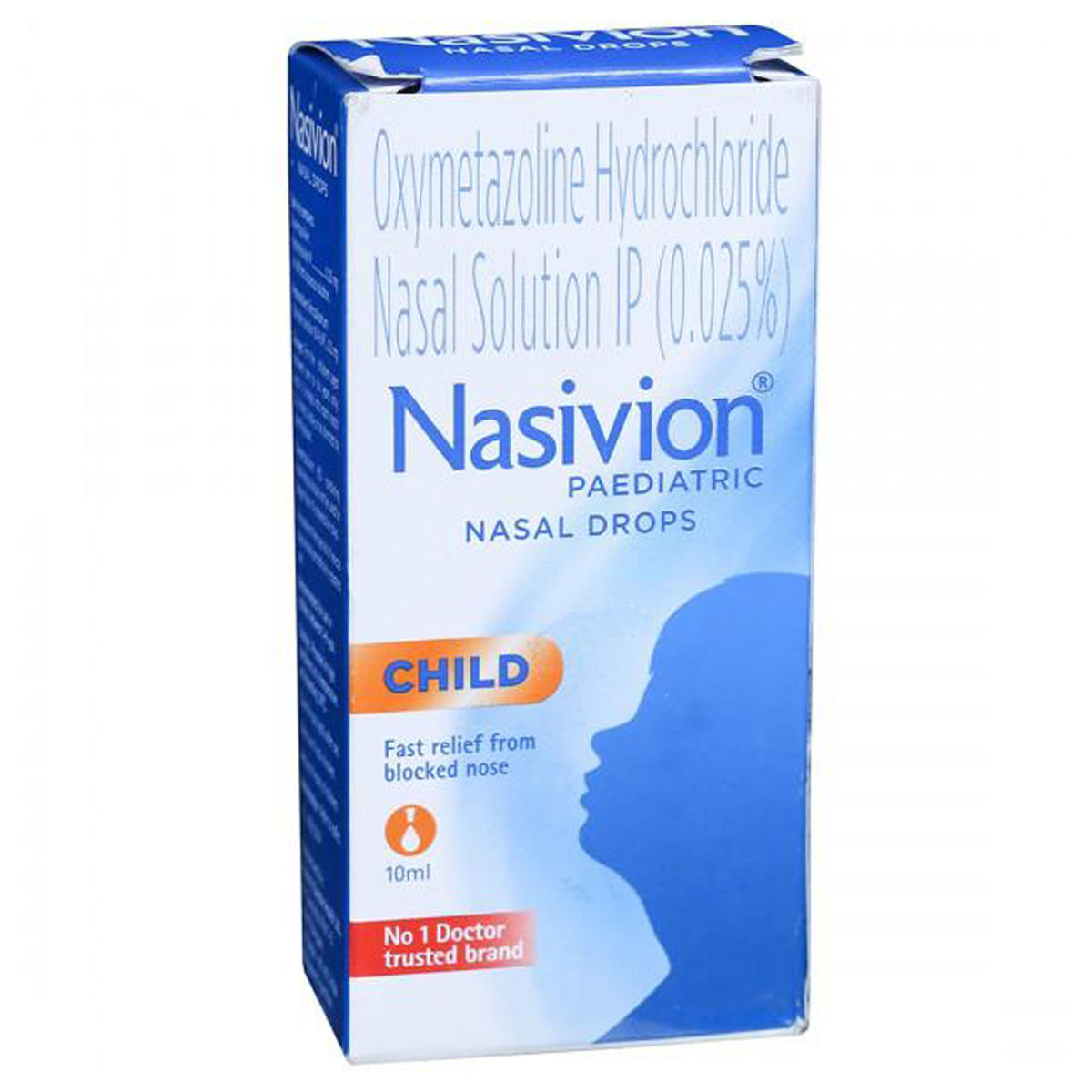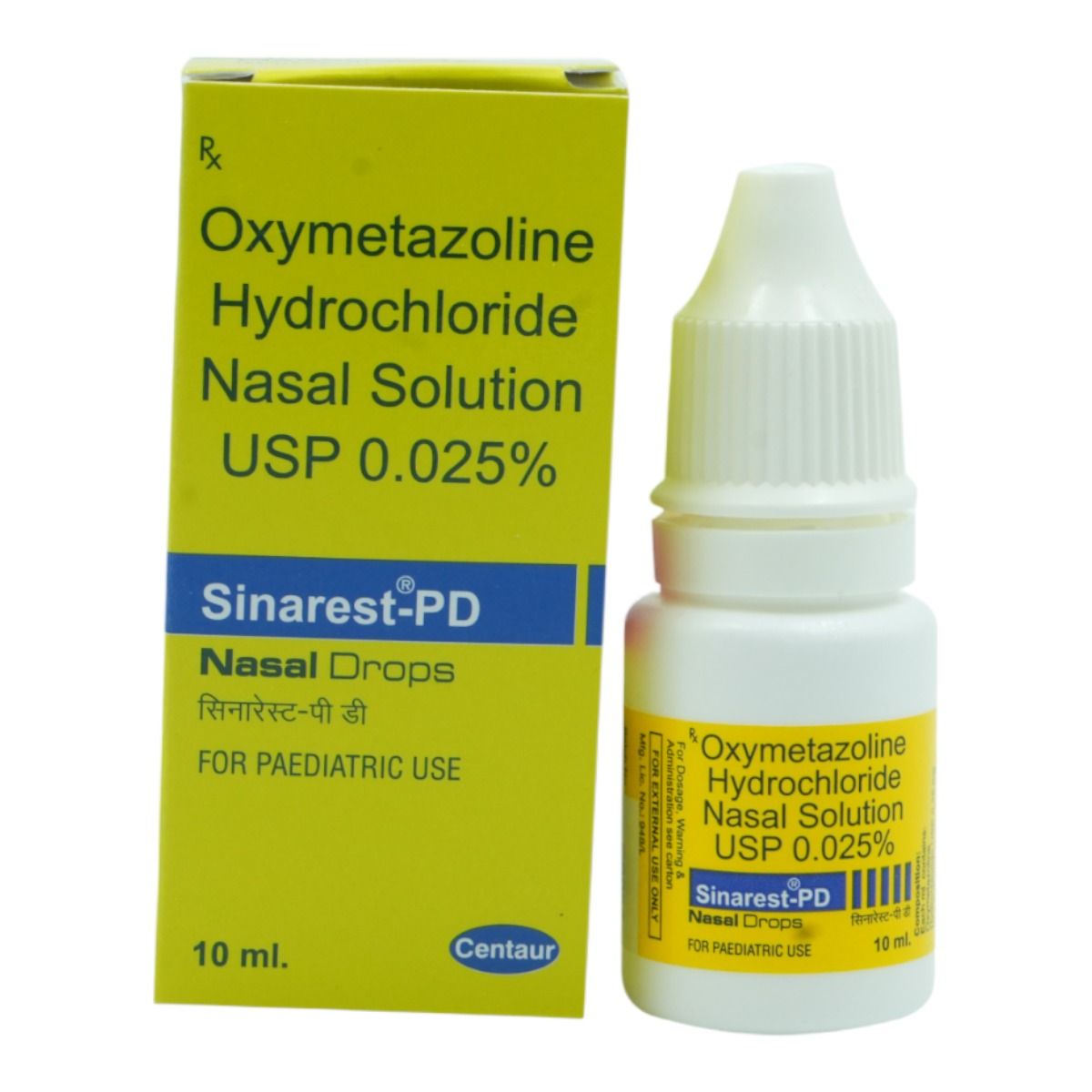Oxymetazoline Hydrochloride
About Oxymetazoline Hydrochloride
Oxymetazoline Hydrochloride belongs to the class of medications called nasal decongestants primarily used to treat nasal congestion (stuffy nose) caused by hay fever (allergic rhinitis), common colds, flu, sinusitis, or other allergic sinusitis. Nasal congestion, also known as a stuffy nose, occurs when nasal passages become swollen with excess mucus and fluid.
Oxymetazoline Hydrochloride contains Oxymetazoline Hydrochloride, a nasal decongestant that works by contracting and narrowing the blood vessels in the linings of nasal passages. Thus, Oxymetazoline Hydrochloride provides relief from congestion and decreases mucus production.
Use Oxymetazoline Hydrochloride as prescribed by your doctor. You are advised to use Oxymetazoline Hydrochloride for as long as your doctor has prescribed it based on your medical condition. Some people may experience irritation or dryness of the nasal mucosa (tissue lining the nasal cavity), local burning sensation, headache, and nausea. Most of these side effects of Oxymetazoline Hydrochloride do not require medical attention and gradually resolve over time. However, if the side effects persist or worsen, please consult your doctor.
Please tell your doctor if you are allergic to Oxymetazoline Hydrochloride or any other medicines. If you are pregnant or breastfeeding, inform your doctor before using the Oxymetazoline Hydrochloride. Avoid taking Oxymetazoline Hydrochloride if you have narrow-angle glaucoma or if you have undergone recent trans-nasal surgery. If you have diabetes, high blood pressure, hyperthyroidism, or heart disease, inform your doctor before taking Oxymetazoline Hydrochloride. You are recommended to remove nasal fluids before using this medicine. Avoid sharing Oxymetazoline Hydrochloride with other people to prevent the spread of infection.
Uses of Oxymetazoline Hydrochloride
Medicinal Benefits
Oxymetazoline Hydrochloride contains Oxymetazoline Hydrochloride, a nasal decongestant that contracts and narrows the blood vessels in the linings of nasal passages. Thus Oxymetazoline Hydrochloride, clears the blocked nose and decreases mucus production.
Directions for Use
Storage
Side Effects of Oxymetazoline Hydrochloride
- Irritation or dryness of the nasal mucosa (tissue lining nasal cavity)
- Local burning sensation
- Headache
- Nausea
Drug Warnings
Please tell your doctor if you are allergic to Oxymetazoline Hydrochloride or any other medicines. If you are pregnant or breastfeeding, inform your doctor before using Oxymetazoline Hydrochloride. Oxymetazoline Hydrochloride is not recommended for children unless advised by a doctor. Avoid taking Oxymetazoline Hydrochloride if you have narrow-angle glaucoma or if you have undergone recent trans-nasal surgery. If you have diabetes, high blood pressure, hyperthyroidism or heart disease, inform your doctor before taking Oxymetazoline Hydrochloride. You are recommended to remove nasal fluids before applying Oxymetazoline Hydrochloride by blowing the nose. Avoid sharing Oxymetazoline Hydrochloride with other people to prevent the spread of infection.
Drug Interactions
Drug-Drug Interactions: Oxymetazoline Hydrochloride may interact with antidepressants (imipramine, desipramine, amitriptyline), ergot alkaloids (ergonovine, dihydroergotamine, ergotamine) and MAO inhibitors (linezolid, selegiline, tranylcypromine).
Drug-Food Interactions: Oxymetazoline Hydrochloride may interact with caffeine. Therefore, avoid or limit the intake of caffeine (chocolate, tea, coffee, colas and some herbal supplements), with Oxymetazoline Hydrochloride, as it may increase the risk of adverse effects such as sleep problems, rapid heartbeat, nervousness, nausea or tremor.
Drug-Disease Interactions: If you have diabetes, high blood pressure, hyperthyroidism, enlarged prostate gland, narrow-angle glaucoma or heart disease, inform your doctor before taking Oxymetazoline Hydrochloride.
Drug-Drug Interactions Checker List:
Safety Advice

Alcohol
cautionLimit alcohol intake as it may cause increased dizziness.

Pregnancy
cautionOxymetazoline Hydrochloride is a pregnancy category C medicine. It should be used in pregnant women only if clinically needed. Please consult your doctor; your doctor will weigh the benefits and potential risks before prescribing Oxymetazoline Hydrochloride.

Breast Feeding
cautionPlease consult your doctor if you are breastfeeding. Your doctor will weigh the benefits and potential risks before prescribing Oxymetazoline Hydrochloride.

Driving
cautionOxymetazoline Hydrochloride may cause dizziness. So, do not drive or operate heavy machinery unless you are alert.

Liver
cautionPlease consult a doctor before using Oxymetazoline Hydrochloride if you have liver problems.

Kidney
cautionPlease consult a doctor before using Oxymetazoline Hydrochloride if you have kidney problems.

Children
safe if prescribedOxymetazoline Hydrochloride can be safely used in children.
Habit Forming
Diet & Lifestyle Advise
- Add ginger to foods or tea as it contains some anti-inflammatory compounds that can relax membranes in the airways and reduce cough, irritation and swelling in nasal passages.
- Staying hydrated is vital for those with a cough or cold. Drink liquids at room temperature to get relief from runny nose, cough, and sneezing.
- The immune system is affected by stress and raises the risk of being sick. Do meditation, deep breathing, regular exercise and try progressive muscle relaxation techniques to get relief from stress.
- It is advised to avoid contact with known allergens (allergy-causing agents) such as pollen, dust, etc. Certain food items are known to cause allergies to you.
- Maintain personal hygiene and keep your surroundings clean.
Patients Concern
Disease/Condition Glossary
Nasal congestion: Nasal congestion is also known as stuffy nose that occurs when nasal passages become swollen with excess mucus and fluid. Nasal congestion may be caused by hay fever, allergies, nasal polyps (non-cancerous growths) or benign tumours in the nasal passages, environmental irritants or a long lasting sinus infection. It may also be triggered by tobacco smoke, perfume or an infection. Rinsing the inside of the nose with saline solution and using a humidifier at home may help to provide relief from congestion. Consult a doctor if you have severe nasal discharge, fever, sinus pain, or difficulty breathing.
FAQs
Oxymetazoline Hydrochloride belongs to the class of medications called nasal decongestants primarily used to treat nasal congestion (stuffy nose) caused by hay fever (allergic rhinitis), common colds, flu, sinusitis, or other allergic sinusitis.
Oxymetazoline Hydrochloride constricts the blood vessels and reduces the blood flow to the affected area. Thereby it provides relief from inflammation and reduces the symptoms.
Oxymetazoline Hydrochloride may cause recurrence of symptoms when used for long-term. So, it is not recommended for more than seven days. If the symptoms do not improve within seven days, contact your doctor.
Oxymetazoline Hydrochloride may cause an increase in blood pressure. Therefore, it should be used with caution in patients with hypertension (high blood pressure). Inform your doctor if you have high blood pressure before starting Oxymetazoline Hydrochloride.
Oxymetazoline Hydrochloride may cause drowsiness and dizziness. So, avoid driving or operating heavy machinery after using this medicine.
Oxymetazoline Hydrochloride should not be taken with antidepressants. Antidepressants can increase the effect of Oxymetazoline Hydrochloride and cause high blood pressure. Do not take Oxymetazoline Hydrochloride if you take monoamine oxidase inhibitors (for depression) or have taken them in the last 14 days.








